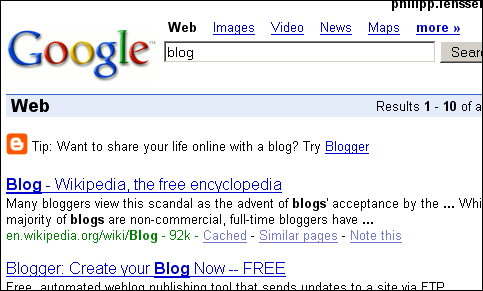Friday, December 29, 2006
Google Pimps Own Services in Search Results, Part 2

Google was recently seen increasing their self-promotion on top of organic search results – using graphical tipvertorials for search queries like “blog”, “blogger”, “calendar”, “photo sharing”, and even “blogoscoped” or “flickr photo sharing” (these “tips” are promoting Google’s services, but they aren’t declared as ads).
|
|
Now Firefox co-founder Blake Ross chimes in to the discussion, saying this is “clearly bad for competitors, and its also a bad sign for Google.” Blake explains why he thinks these “tips” are bad for users, and a kind of “new age bundling”: |
First, two notes. One, Yahoo and Ask already do this, but they didnt build their businesses on the promise of being unconventionally trustworthy. And two, Google has been doing similar things for awhile. Search The Holiday and youll get a special box pointing to reviews of and tickets for the movie. The difference is that this is still a filter on the Web; the reviews link to their sources and the tickets link to Fandango. Google may share the Fandango revenue and certainly shuts out competitors, but as a user, I get better service than I would without the box. [Note: Google also used to display tipvertorials for Google Image Search before, but they were non-graphical, not quite as frequent, and leading to another search result.]
The tips are different – and bad for users – because the services they recommend are not the best in their class. If Google wants to make it faster and easier for users to manage events, create a blog or share photos, it could do what it does when you search GOOG: link to the best services. To prevent Google from being the gatekeeper, the company could identify the services algorithmically.
But if that sounds familiar, perhaps thats because Google already works that way. After all, Google is predicated on the idea that the democratic structure of the Web will push the cream to the top. Search for “photo sharing” and you should already get the highest quality services. According to Google, Picasa is not one of them. These “tips,” then, can only be a tacit admission of failure: either the company does not believe in its own search technology, or it does not believe its products are good enough to rise to the top organically. I’d guess the latter. And if I were on the Calendar, Blogger or Picasa teams, I wouldn’t be celebrating the news that my employer has lost faith in me.
I agree with Blake. And it’s kinda sad to find the same company that proudly proclaimed they use the AdWords system like any other competitor now escape that system (even adding graphics, which nobody can do through AdWords for Google results). On December 7, Google wrote:
It’s important to note, however, that our ads are created and managed under the exact same guidelines, principles, practices and algorithms as the ads of any other advertiser. Likewise, we use the very same tools and account interface.
That was just about 2 weeks before they started rolling out graphical tipvertorials using some very different tools than AdWords (probably, the “tool” is to get this ad through Google management, then walk to the next office and tell the programmer to put the whole thing life). I second Blake’s objection that it will be hard for Google to regain trust if they continue on this road. Or, as Valleywag’s Nick Douglas once put it: credibility is like virginity.
[Thanks David Hetfield!]
Update: Google’s Matt Cutts shares his views on the issue.
Update 2: Search Engine Land’s Danny Sullivan writes:
I really dislike other companies getting free passes when Google is held up to higher standards. Blake notes that Microsoft and Yahoo both do self-promotion, but he somehow thinks it’s Google that should be put on fire. I disagree. They all should be put up on fire. Singling out Google distorts the underlying argument. If it’s bad, it’s bad for any of them to do it, not because we love Google so much and are disappointed or because Google should be held to a higher standard.
On the other hand, Mike Arrington of Techcrunch argues:
Part of the problem is that Google has always held itself to a higher standard than other companies. We took them seriously when they said their corporate motto is “Dont be evil”. It was the right thing to say when they were young and battling the hated Microsoft. But today, as they begin to put themselves before whats best for their users, that motto is coming back to haunt them.
They can’t redact the motto, of course. They can’t take back those words. Google will forever be held to a higher standard than everyone else, simply because they asked us to.
>> More posts
Advertisement
This site unofficially covers Google™ and more with some rights reserved. Join our forum!

